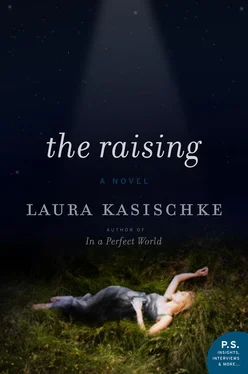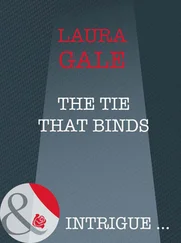Then the red lights of the car ahead of her swerved, and blinked, and seemed to dance in the air for a few wild seconds. And then they vanished.
How many hundreds of hours had she logged on Google by now, searching for information on the accident? The girl. The boy. The “investigation,” which seemed to have ended before it ever began.
But every hit Shelly came across that wasn’t the local paper’s colorful misinformation had something to do with the cherry trees in the memorial orchard at the dead girl’s sorority, or quoted sappy things her sorority sisters had to say about her purity. Shelly plugged in her own name, and found nothing. She plugged in the date and accident and, on a whim, the truth . Nothing. She plugged in the truth and the name of Nicole Werner’s sorority, and came up with one surprising detail about a music school student, a violinist named Denise Graham, who’d disappeared in the spring, right around the time of the accident—and many of the same sorority sisters who were quoted as saying that Nicole was “the sweetest girl who ever lived” said of the disappeared violinist, “She was really aloof and strange. No one ever got to know her.”
It almost seemed staged, this juxtaposition, as if to prove that Nicole had, indeed, been an angel in the guise of a sorority girl—the proof being that this other one’s life was of such little concern to anyone. If she’d ever been located, there was nothing about it on the Internet that Shelly could find.
“Shelly?”
Josie was standing in the threshold, wearing her usual surprised expression. It had taken Shelly three months of working with this girl before she realized that Josie wasn’t actually surprised by anything, ever. That the expression was some kind of amusement—perhaps at someone else’s expense. Perhaps Shelly’s.
“Yes?”
“Would it be okay with you if I went down to Starbucks? Espresso fix? I could get you something?”
“That’s fine. Go ahead. But I don’t need anything.”
“You sure?”
“I’m sure.”
After Josie had clipped away in her little hard-soled shoes, Shelly went back to the file she’d opened on her computer—numbers surging electrically, shimmering, seeming for the moment to be unrecognizable as anything but shapes and dots. She rubbed her eyes and leaned back in her chair, and after she thought it had been long enough for Josie to get down the stairs and out to the street, she looked out the window, found Josie among the hundreds of other students passing (between classes) on the sidewalk, and then watched her sway along the sidewalk with her hands tucked into the pockets of her cashmere hoodie, threading her elegant way toward Starbucks.
The girl’s back was straight, and her long, dark hair whipped around her face. She was gorgeous. As Josie crossed the street, Shelly saw two guys turn around to watch her, and although Shelly was too far away to see their faces, she could see that they were nudging one another the way guys did when they were talking about a girl’s body. Josie bent over and picked something up—a dropped coin?—and put it in her pocket, and then ran her hand through her beautiful hair. The two guys had a hard time walking straight while craning their necks around to observe her ass. Shelly turned back to her computer screen.
She dreaded it, but she was going to have to fire Josie Reilly, who’d worked in the office only since July. She was the most unreliable work-study student Shelly’d ever had, and had gotten hired because, frankly, it was hard to find work-study students living on campus during the summer months. Josie had also seemed so intelligent, so composed, during her interview, that Shelly had been genuinely impressed.
But now, nearly every afternoon, there were guys hanging around in the lobby waiting for her more than an hour before she was supposed to get off work—cracking jokes, talking about parties—until, finally, exhausted by her own annoyance, Shelly would say, “You can leave early if you want to, Josie,” to which Josie never objected.
Then, each Monday, the one day Josie was supposed to come into the office in the morning, she never failed to stumble in an hour late, apologizing profusely but always with that amused look on her face.
And, inexcusably, a few weeks earlier, Shelly had found the expense-reimbursement form for the Marymount String Quartet, which was supposed to have been submitted a month before, collecting dust under Josie’s desk. There was a doodle of a shoe on the back of the form—a high heel with straps and buckles. “Oh, my God!” Josie shrieked when Shelly waved the piece of paper at her, but she offered no real explanation, just a series of false-sounding self-recriminations, and there was always that look on her face.
It was true that all of Shelly’s work-study students over the years had been bad, and she’d tried repeatedly to make a case to the dean that what she needed was a real assistant, but every year they foisted a new work-study kid on her. They were all sloppy, unreliable, and empty-headed, for the most part, but Josie Reilly was perhaps the worst. She barely even made an effort to pretend she was making an effort.
Shelly looked back out the window just in time to see her come out of Starbucks with a cup in each hand.
She always did that.
Shelly always told Josie she didn’t want anything, and Josie always brought her something anyway. It would have seemed thoughtful if it didn’t somehow also seem like an afterthought, as if Josie had gotten to the Starbucks with no recollection whatsoever of what Shelly had answered when she’d asked her if she wanted anything.
As Josie crossed the street back to the Chamber Music Society offices, she glanced up and Shelly ducked away from the window, looking back at her computer fast, feeling her cheeks flush, her heart beating in embarrassment.
Josie Reilly seemed to her to be precisely the kind of sorority girl who would assume that because Shelly was a lesbian she was attracted to her . She was, Shelly thought, precisely the kind of girl who went through the world assuming everyone was attracted to her.
Josie would assume she was being watched by her boss from the window of her office because she was so irresistible. She would come back into the offices bearing that paper cup of hot chocolate, or mint tea, or peppermint chai, and Shelly was going to have to look into her amused expression without batting an eye, and take it from her, and thank her, and offer to pay her the outrageous three or four dollars it had cost. And, this time, because she’d been caught watching the girl cross the street—horny old dyke in a position of power at a university so sensitive to such matters that the very air around them felt censored, as if it had actually become possible to neuter the mind —Shelly would now have to wait at least another week before she fired her.
The twins threw themselves onto the living room floor—Andy on his butt, Matty on his face—when Mira walked in the door. It was a part of the routine.
She came back from her teaching and her office in the afternoons, and they wept and screamed for a solid hour while Clark stomped around the apartment. When she asked him if they’d been fussy during the day, he shook his head with his lips sealed tightly, letting her know that this behavior had to do with her , and was, therefore, her problem.
But what, she wondered, did it mean? Were the boys weeping with excitement because she was back, or crying with their just-realized grief that she’d been gone? Mira’s terrible suspicion was that they’d longed to cry all day, but because their father seemed either so unsympathetic in his weariness or so close himself to cracking, they’d suppressed it until she came home.
Читать дальше












